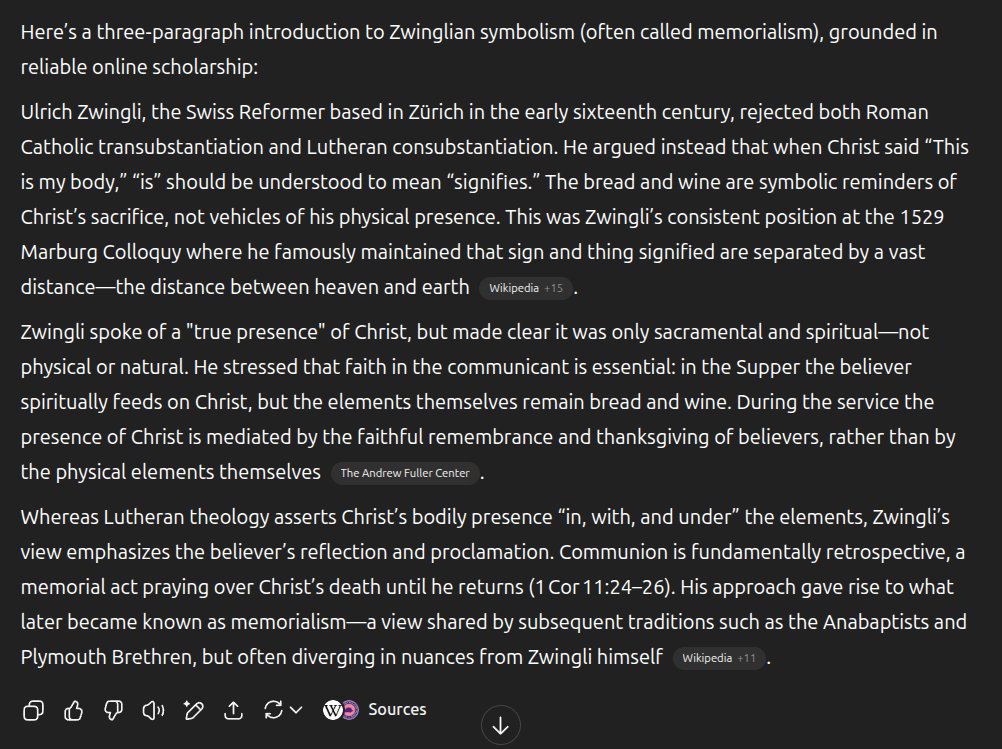I am nailing Nine Theses to the door of @Wikipedia. This has been my project for the last nine months. There has never been a thoroughgoing Wikipedia reform proposal—this is the first. If it doesn't work, we need to organize an alternative. 🧵 

Read:
Wikipedia could change. It's not impossible.
But only if you make a lot of noise both on social media and on Wikipedia itself. The current narrative is controlled by a few hundred people. What if 1000s (politely) descended on Wikipedia?en.wikipedia.org/wiki/User:Larr…
Wikipedia could change. It's not impossible.
But only if you make a lot of noise both on social media and on Wikipedia itself. The current narrative is controlled by a few hundred people. What if 1000s (politely) descended on Wikipedia?en.wikipedia.org/wiki/User:Larr…
These are, in fact, very reasonable, commonsense proposals from anybody's point of view. We can put pressure on Wikipedia at all levels to adopt them. If they do nothing or refuse to change, there will be consequences. 

Wikipedia's current framework is "GASP": globalist, academic, secular, and progressive. Four of the theses are aimed at correcting, or reforming, this framework. But there are other ways in which Wikipedia needs to be reformed. 

If Wikipedia removes the theses from the platform, they can still be found on my blog. They cannot silence us. They can't stop us from protesting them and pressing for real change. And if they refuse, consider what's next.
larrysanger.org/nine-theses/
larrysanger.org/nine-theses/
1. End decision-making by “consensus.”
Wikipedia pretends to make difficult editorial decisions based on “consensus.” This is a sham that allows ideologues to silence dissent, by falsely claiming unanimous agreement. “Consensus” must be abandoned as a description of how they actually reach decisions.
On Wikipedia: en.wikipedia.org/wiki/User:Larr…
On LarrySanger.org:
larrysanger.org/1-end-decision…
Wikipedia pretends to make difficult editorial decisions based on “consensus.” This is a sham that allows ideologues to silence dissent, by falsely claiming unanimous agreement. “Consensus” must be abandoned as a description of how they actually reach decisions.
On Wikipedia: en.wikipedia.org/wiki/User:Larr…
On LarrySanger.org:
larrysanger.org/1-end-decision…
2. Enable competing articles.
Since true neutrality is impossible under the current editorial monopoly, Wikipedia should allow multiple competing articles written from different declared perspectives, each striving for neutrality within its framework. Let people write alternative articles.
Wikipedia: en.wikipedia.org/wiki/User:Larr….
LarrySanger.org:
larrysanger.org/2-enable-compe…
Since true neutrality is impossible under the current editorial monopoly, Wikipedia should allow multiple competing articles written from different declared perspectives, each striving for neutrality within its framework. Let people write alternative articles.
Wikipedia: en.wikipedia.org/wiki/User:Larr….
LarrySanger.org:
larrysanger.org/2-enable-compe…
3. Abolish source blacklists.
Wikipedia maintains a list of “Perennial sources,” which serves as an ideologically one-sided blacklist of media sources. You can’t cite the New York Post or Fox News, or you, on Wikipedia. The blacklist should be abolished; diverse sources should be cited with acknowledgment of how different groups assess their credibility.
On Wikipedia: en.wikipedia.org/wiki/User:Larr….
On LarrySanger.org:
larrysanger.org/3-abolish-sour…
Wikipedia maintains a list of “Perennial sources,” which serves as an ideologically one-sided blacklist of media sources. You can’t cite the New York Post or Fox News, or you, on Wikipedia. The blacklist should be abolished; diverse sources should be cited with acknowledgment of how different groups assess their credibility.
On Wikipedia: en.wikipedia.org/wiki/User:Larr….
On LarrySanger.org:
larrysanger.org/3-abolish-sour…
4. Revive the original neutrality policy.
Wikipedia must return to genuine neutrality by refusing to take sides on contentious topics, even when one view dominates academia or mainstream media.
On Wikipedia:
en.wikipedia.org/wiki/User:Larr….
On LarrySanger.org:
larrysanger.org/4-revive-the-o…
Wikipedia must return to genuine neutrality by refusing to take sides on contentious topics, even when one view dominates academia or mainstream media.
On Wikipedia:
en.wikipedia.org/wiki/User:Larr….
On LarrySanger.org:
larrysanger.org/4-revive-the-o…
5. Repeal “Ignore all rules.”
The “Ignore all rules” policy, originally a joke to encourage newcomers, now shields insiders from accountability. I made this rule. I now say it should be repealed.
On Wikipedia:
en.wikipedia.org/wiki/User:Larr…
On LarrySanger.org:
larrysanger.org/5-repeal-ignor…
The “Ignore all rules” policy, originally a joke to encourage newcomers, now shields insiders from accountability. I made this rule. I now say it should be repealed.
On Wikipedia:
en.wikipedia.org/wiki/User:Larr…
On LarrySanger.org:
larrysanger.org/5-repeal-ignor…
6. Reveal who Wikipedia’s leaders are.
Wikipedia's most powerful editors remain overwhelmingly anonymous despite wielding enormous influence over one of the world’s most powerful media platforms. These leaders must be publicly identified for accountability (and given liability insurance).
On Wikipedia:
en.wikipedia.org/wiki/User:Larr….
On LarrySanger.org:
larrysanger.org/6-reveal-who-w…
Wikipedia's most powerful editors remain overwhelmingly anonymous despite wielding enormous influence over one of the world’s most powerful media platforms. These leaders must be publicly identified for accountability (and given liability insurance).
On Wikipedia:
en.wikipedia.org/wiki/User:Larr….
On LarrySanger.org:
larrysanger.org/6-reveal-who-w…
7. Let the public rate articles.
Wikipedia should implement a public rating system, allowing readers to evaluate articles, using provably unique human raters from outside the editor community.
On Wikipedia:
en.wikipedia.org/wiki/User:Larr….
On LarrySanger.org:
larrysanger.org/7-let-the-publ…
Wikipedia should implement a public rating system, allowing readers to evaluate articles, using provably unique human raters from outside the editor community.
On Wikipedia:
en.wikipedia.org/wiki/User:Larr….
On LarrySanger.org:
larrysanger.org/7-let-the-publ…
8. End indefinite blocking.
Wikipedia’s practice of blocking accounts permanently is unjust and ideologically motivated. Indefinite blocks should be extremely rare, require multiple administrators to agree, and face periodic review.
On Wikipedia:
en.wikipedia.org/wiki/User:Larr….
On LarrySanger.org:
larrysanger.org/8-end-indefini…
Wikipedia’s practice of blocking accounts permanently is unjust and ideologically motivated. Indefinite blocks should be extremely rare, require multiple administrators to agree, and face periodic review.
On Wikipedia:
en.wikipedia.org/wiki/User:Larr….
On LarrySanger.org:
larrysanger.org/8-end-indefini…
9. Adopt a legislative process.
Wikipedia lacks any method of major reform. Because it needs major reform, it needs an elected editorial legislature with real power to implement reforms, established through Wikipedia’s first constitutional convention.
On Wikipedia:
en.wikipedia.org/wiki/User:Larr….
On LarrySanger.org:
larrysanger.org/9-adopt-a-legi…
Wikipedia lacks any method of major reform. Because it needs major reform, it needs an elected editorial legislature with real power to implement reforms, established through Wikipedia’s first constitutional convention.
On Wikipedia:
en.wikipedia.org/wiki/User:Larr….
On LarrySanger.org:
larrysanger.org/9-adopt-a-legi…
• • •
Missing some Tweet in this thread? You can try to
force a refresh














